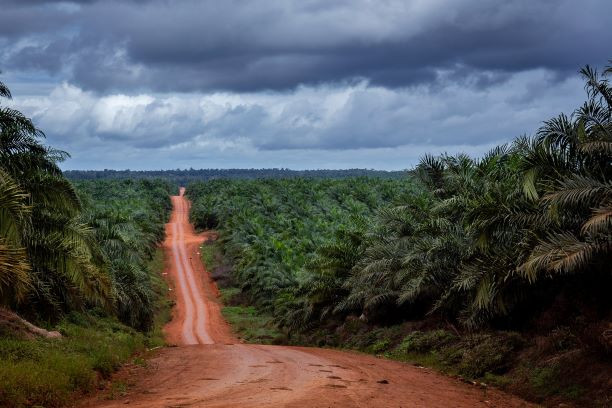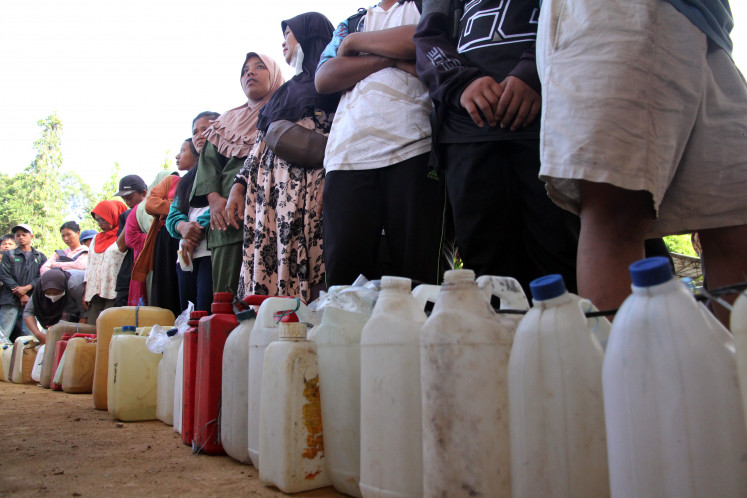Popular Reads
Top Results
Can't find what you're looking for?
View all search resultsPopular Reads
Top Results
Can't find what you're looking for?
View all search resultsExperts slam amnesty for illegal palm plantations
Move may result continued violations in the future.
Change text size
Gift Premium Articles
to Anyone
T
he government is expected to grant an amnesty to the owners, mostly large corporations, of some 3.3 million hectares of illegal oil palm plantations located in forest areas, as analysts condemn the move as a bad precedent that will incentivize future violations.
Coordinating Maritime Affairs and Investment Minister Luhut Pandjaitan described the move as unavoidable and said there was not much the state could do about the illegal plantations.
Instead, he gave an assurance that giving the amnesty to the firms would help enforce compliance and transparency from production to taxation.
“Palm plantations located in the forests will be pardoned. What else is there to do? It’s impossible to remove them that’s why they will be legalized,” said Luhut, as quoted by Kompas.
Indonesia has a total of 16.8 million ha of oil palm plantations, with over 61 percent of these owned by corporations, while the rest belongs to smallholder farmers, according to the Development Finance Comptroller (BPKP).
The amount of illegal plantations located in forest areas due to be amnestied by the government comprises around 20 percent of the total.
The decision came shortly after the government formed a palm oil task force in mid-April, with its steering committee chaired by Luhut.
At the same time, the government is in the process of negotiating with the European Union to tone down the bloc’s upcoming deforestation regulation (EUDR), which will tighten rules on trading commodities associated with deforestation.
Luhut went on to say that the government had asked firms to self-report permits that they owned, which would be followed by audits on their compliance, as well as investigations into related parties if necessary.
“Audit results found that many of the players don’t have any permits, such as for locations and land cultivation rights [HGU]. Thus, all players are expected to be orderly, disciplined and to submit real data,” said the minister.
The government will issue the amnesties for contraventions through articles 110A and 110B stipulated in the revision of the Deforestation Prevention Law as outlined in the 2021 Job Creation Law, whereby companies are required to declare and resolve any infringements through specified sanctions.
Luhut said the government was still discussing the form of the sanctions, which may include fines.
Read also: EU seeks to conclude trade negotiation with Indonesia before 2024 elections
Tauhid Ahmad, executive director of the Institute for Development of Economics and Finance (INDEF) told the Post on Monday, described the legalizing of illegal plantations as inconsistent.
The government’s decision could lead the firms to repeat similar violations in the future given that the state had decided to pardon the violators instead of upholding law enforcement, said Tauhid.
“Many corporations will benefit from this situation. […] If the audit found that there were [unlawful plantations], the state must reclaim the land,” Tauhid said.
Similar to the government, Greenpeace Indonesia said it had found 3.12 million ha of illegal oil palm plantations located in forest areas as of 2019, according to the organization’s report published in October 2021.
The report listed dozens of palm oil companies operating thousands of hectares of plantations in protected forest and conservation areas. Among these were Musim Mas and Asian Agri.
Neither company immediately responded to requests for comments.
Read also: RI, Malaysia seeks to soften EU palm oil stance
Greenpeace Indonesia forest campaigner Arie Rompas told the Post on Monday that the government has issued similar amnesties twice before, in 2012 and 2015. He was of the opinion that the decision was a result of “political interests”.
“Indonesian government policies are determined in accordance with the interests of a few corporates, we can call them oligarchs,” Arie said.
He believed these policy changes were loaded in favor of these interests as many of the people behind the Job Creation Law were “connected with the companies” that had violated the rules, especially regarding deforestation.
Concurring with Tauhid, Arie said the amnesty would set a bad precedent and have future repercussions as palm oil players would not take regulations seriously.
“Law enforcement will not be viewed as being in earnest,” Arie said.










